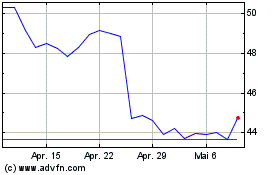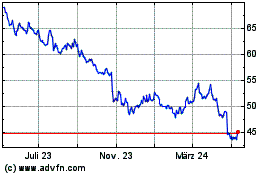Bristol's Bonds Sell Easily -- WSJ
08 Mai 2019 - 9:02AM
Dow Jones News
By Sam Goldfarb
This article is being republished as part of our daily
reproduction of WSJ.com articles that also appeared in the U.S.
print edition of The Wall Street Journal (May 8, 2019).
Bristol-Myers Squibb Co. sold $19 billion of bonds on Tuesday,
seizing on low interest rates to help fund its blockbuster
acquisition of Celgene Corp.
Coming off solid first-quarter earnings, Bristol-Myers issued
bonds with maturities ranging from 1 1/2 to 30 years, investors
said. The $19 billion total amount was the highest for a U.S.
corporate bond sale this year and the largest since Comcast Corp.
sold $27 billion of bonds in October to finance its purchase of Sky
PLC, according to Dealogic.
Like many other companies that have executed bond sales of at
least $10 billion in recent years, Bristol-Myers had little trouble
placing its debt, investors and analysts said.
When the drug company announced in early January a deal to buy
rival Celgene for roughly $74 billion, demand for corporate debt
was soft, leading to higher potential borrowing costs for
companies. Since then, however, Treasury yields have fallen and
investors have demanded a smaller amount of extra yield, or spread,
to hold corporate bonds over government debt.
While Bristol-Myers has historically been a conservative
borrower, it is now wagering that acquiring Celgene will expand its
pipeline of drugs and give it more leverage in negotiations with
insurance companies and pharmacy-benefit managers that determine
reimbursement and coverage. The acquisition is expected to close in
the third quarter.
Before the bond sale, some investors said the relatively small
amount of existing Bristol-Myers bonds in circulation would help
the company sell its debt.
The new bonds will "give investors an opportunity to buy a
higher-quality name in the pharmaceutical sector that will be much
more liquid than it has in the past," said Bob Summers, a portfolio
manager at Neuberger Berman.
As is typical for an investment-grade bond sale, Bristol-Myers'
underwriters initially guided the new bonds at relatively elevated
spreads and then brought them down later in the day. Its new
10-year bonds were ultimately sold at 99.175 cents on the dollar
with a 3.4% coupon. That translates to a 1.05 percentage-point
spread to Treasurys -- a modest premium to its existing bonds --
down from early guidance of a roughly-1.2-percentage-point
spread.
Analysts at the research firm CreditSights have projected that
Bristol-Myers's ratio of debt to earnings before interest, taxes,
depreciation and amortization, or Ebitda, would rise to 3.2 times
from 0.7 times after the acquisition. They also estimate the
company would be able to generate $14 billion to $16 billion of
annual free cash flow over the next three years, allowing it to cut
its debt-to-Ebitda ratio roughly in half during that span.
Even with the increase in debt, Moody's Investors Service
indicated last week that it would likely downgrade Bristol-Myers'
credit rating only one notch to A3 from A2. That sets the company
apart from many other companies that have settled to the bottom
rung of the investment-grade credit ladder, a trend that has raised
concern about downgrades to junk if there is an economic
downturn.
Both Bristol-Myers and Celgene have had their challenges in
recent years. Bristol-Myers has lost its advantage in immunotherapy
treatment of lung cancer to rival Merck & Co., while Celgene
has struggled to find new products to offset the looming patent
expiration of its top-selling cancer drug, Revlimid.
Still, Bristol-Myers last month reported higher-than-expected
revenue in the first quarter, helped by stronger demand for its
immunotherapy drug Opdivo and blood thinner Eliquis.
Bristol-Myers' bond sale will boost the 2019 tally of
investment-grade bond issuance, which has matched last year's pace
but fallen below the record-setting standards of other recent
years.
Through Monday, nonfinancial companies had sold $272 billion of
investment-grade bonds in the U.S. That compares with $270 billion
over the same period a year earlier and $304 billion in 2017, when
issuance ultimately reached a record $847 billion.
Write to Sam Goldfarb at sam.goldfarb@wsj.com
(END) Dow Jones Newswires
May 08, 2019 02:47 ET (06:47 GMT)
Copyright (c) 2019 Dow Jones & Company, Inc.
Bristol Myers Squibb (NYSE:BMY)
Historical Stock Chart
Von Mär 2024 bis Apr 2024

Bristol Myers Squibb (NYSE:BMY)
Historical Stock Chart
Von Apr 2023 bis Apr 2024
